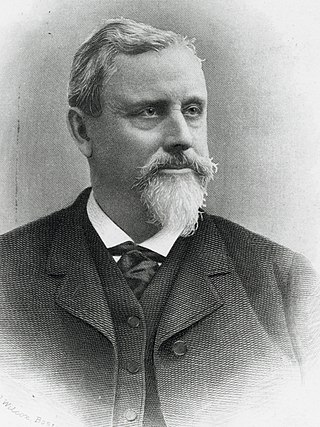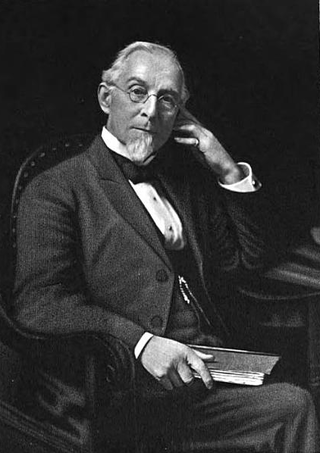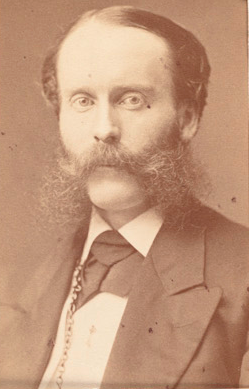| ||||||||||||||||
| ||||||||||||||||
| ||||||||||||||||
The Boston mayoral election of 1890 saw the election of Nathan Matthews Jr. Incumbent Mayor Thomas N. Hart was defeated for the Republican nomination by Moody Merrill. [2]
| ||||||||||||||||
| ||||||||||||||||
| ||||||||||||||||
| Elections in Massachusetts |
|---|
 |
The Boston mayoral election of 1890 saw the election of Nathan Matthews Jr. Incumbent Mayor Thomas N. Hart was defeated for the Republican nomination by Moody Merrill. [2]
| Party | Candidate | Votes | % | |
|---|---|---|---|---|
| Democratic | Nathan Matthews Jr. | 32,210 | 59.37% | |
| Republican | Moody Merrill | 19,957 | 36.78% | |
| Prohibition | Samuel B. Shapleigh | 2,043 | 3.77% | |
| Others | Scattering | 44 | 0.08% | |
| Turnout | 54,254 | |||

Hugh O'Brien served as the mayor of Boston from 1884 to 1888. O'Brien is notable as Boston's first Irish and Catholic mayor, having emigrated from Ireland to America in the early 1830s. O'Brien was the editor of the Shipping and Commercial List and served as a Boston alderman from 1875 to 1883. He was chairman of the Boston Board of Aldermen from 1879 through 1881 and again in 1883.

Patrick Andrew Collins was an American politician lawyer who served as mayor of Boston and as a U.S. Representative from Massachusetts.

Thomas Norton Hart was an American manufacturer, businessman, and politician from Massachusetts who served as mayor of Boston from 1889 to 1890 and from 1900 to 1902.

Josiah Quincy VI was an American politician from Massachusetts who served as mayor of Boston from 1896 to 1900. A member of the Quincy political family, his grandfather Josiah Quincy IV and great-grandfather Josiah Quincy III also had served as mayors of Boston.

John Robert Murphy was a Massachusetts politician and attorney who served as the Commissioner of the Boston Fire Department, Chairman of the Boston Finance Commission and in both branches of the Massachusetts legislature.

The 1892 Wyoming gubernatorial special election was held on November 6, 1892. Republican Governor Francis E. Warren, who was elected in 1890, resigned several weeks into his term after being elected to the U.S. Senate by the state legislature, elevating Secretary of State Amos W. Barber to the governorship and triggering a special election for the balance of Warren's term.
The Boston mayoral election of 1910 occurred on Tuesday, January 11, 1910. John F. Fitzgerald, who had been Mayor of Boston from 1906 to 1908, defeated incumbent George A. Hibbard and two other candidates.
The Boston mayoral election of 1901 occurred on Tuesday, December 10, 1901. Democratic nominee Patrick Collins defeated Republican incumbent mayor Thomas N. Hart and two other contenders.
The Boston mayoral election of 1899 occurred on Tuesday, December 12, 1899. Republican candidate Thomas N. Hart defeated Democratic nominee Patrick Collins and two other contenders, to become mayor for a second tenure. Incumbent mayor Josiah Quincy had announced in July 1899 that he would not seek re-election.
The Boston mayoral election of 1897 occurred on Tuesday, December 21, 1897. In a rematch of the previous election, Democratic incumbent mayor Josiah Quincy defeated Republican former mayor Edwin Upton Curtis to win re-election to a second term. In addition to Curtis, Quincy also defeated two minor challengers.
The Boston mayoral election of 1895 occurred on Tuesday, December 10, 1895. Democratic nominee Josiah Quincy defeated Republican incumbent mayor Edwin Upton Curtis and one other contender to win election to his first term.
The 1894 Boston mayoral election occurred on Tuesday, December 11, 1894. Republican nominee Edwin Upton Curtis defeated Democratic nominee Francis Peabody Jr., and two other contenders, to win election as Mayor of Boston.
The Boston mayoral election of 1887 saw the reelection of Hugh O'Brien (a Democrat to a fourth consecutive term, defeating Republican nominee Thomas N. Hart.
The Boston mayoral election of 1888 saw the election of Thomas N. Hart, who defeated incumbent mayor Hugh O'Brien.
The Boston mayoral election of 1889 saw the reelection of Thomas N. Hart.
Elections are currently held every four years to elect the mayor of Springfield, Massachusetts.

Beginning shortly after the city's incorporation as a city in 1846, elections have been held in the mayor of Manchester, New Hampshire. The following article provides information on the elections for mayor in the city during the 20th century.

George Newton Swallow was an American politician who served in the Massachusetts General Court and on the Massachusetts Governor's Council. He was the Republican nominee for Mayor of Boston in the 1903 Boston mayoral election

Moody Merrill was an American politician, businessman, and fugitive. He served in both houses of the Massachusetts General Court, was president of the Highland Street Railway, helped organize the Boston Consolidated Street Railway, and defeated incumbent Thomas N. Hart to become the Republican nominee in the 1890 Boston mayoral election. In 1893, financial and legal difficulties led him to flee Boston and live under an assumed name in Silver City, New Mexico. He was arrested in 1903, but fled before his trial began. He died before the charges against him could be resolved.